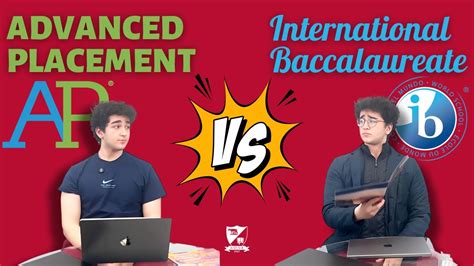Introduction
International Baccalaureate (IB) and Advanced Placement (AP) are rigorous academic programs that provide selective high school students with the opportunity to engage in college-level learning. Both programs offer a diverse range of subjects and provide students with a competitive edge in college admissions. However, there are distinct differences between IB and AP that students and parents should consider when making their choice.

Curriculum and Structure
Advanced Placement (AP)
AP courses are offered by individual high schools that partner with the College Board. Each AP course is designed to be equivalent to a college-level course in a specific subject area. Students take AP exams at the end of each course, and their scores can be used to earn college credit or placement.
There are currently 38 AP courses available in a wide range of subjects, including English, Mathematics, Social Studies, Science, and the Arts.
International Baccalaureate (IB)
The IB program is a two-year comprehensive curriculum that culminates in the IB Diploma Program. The IB Diploma Program consists of six subject groups: Language and Literature, Language Acquisition, Individuals and Societies, Sciences, Mathematics, and the Arts. Students must choose one subject from each group, with a minimum of three Standard Level (SL) and three Higher Level (HL) courses. In addition to the six subject groups, students must also complete a Theory of Knowledge course, an Extended Essay, and a Creativity, Activity, and Service (CAS) component.
Assessment and Grading
Advanced Placement (AP)
AP courses are assessed through exams that are administered by the College Board. Students receive a score from 1 to 5 on each AP exam, with 5 being the highest score. Colleges and universities typically grant college credit or placement to students who score 3 or higher on an AP exam.
International Baccalaureate (IB)
IB courses are assessed through a combination of internal assessments and external exams. Internal assessments are graded by teachers, while external exams are graded by IB examiners. Students receive a grade from 1 to 7 on each IB exam, with 7 being the highest score. The IB Diploma is awarded to students who achieve a minimum score of 24 points on their six IB exams, along with satisfactory completion of the Theory of Knowledge course, Extended Essay, and CAS component.
College Credit and Placement
Advanced Placement (AP)
AP courses can earn students college credit, placement, or both. Over 90% of colleges and universities in the United States accept AP credits. However, the amount of credit and placement that a student receives varies depending on the college or university and the specific AP course taken.
International Baccalaureate (IB)
The IB Diploma is widely recognized by colleges and universities around the world. IB Diploma holders are often eligible for advanced placement, college credit, or both. According to the IB, 95% of IB Diploma holders who apply to US colleges and universities are admitted.
Costs
Advanced Placement (AP)
The cost of AP courses varies depending on the high school and the specific course taken. However, the average cost of an AP exam is around $94.
International Baccalaureate (IB)
The cost of the IB Diploma Program varies depending on the school and the country in which the program is offered. However, the average cost of the IB Diploma Program is around $2,500.
Which Program is Right for You?
The decision of whether to take AP or IB courses depends on several factors, including the student’s academic interests, career goals, college aspirations, and learning style.
Students who should consider AP:
- Are looking to earn college credit and placement.
- Are strong in specific subject areas.
- Prefer a more flexible academic program.
- Are self-motivated and independent learners.
Students who should consider IB:
- Are interested in a well-rounded and interdisciplinary curriculum.
- Are planning to attend a college or university outside the United States.
- Seek a challenging and globally-focused education.
- Are collaborative and enjoy working in groups.
Conclusion
Advanced Placement and International Baccalaureate are both excellent academic programs that can provide students with a competitive edge in college admissions. However, there are distinct differences between the two programs. Students and parents should carefully consider their individual needs and goals when making their choice. By choosing the right program, students can maximize their potential and prepare themselves for success in college and beyond.
